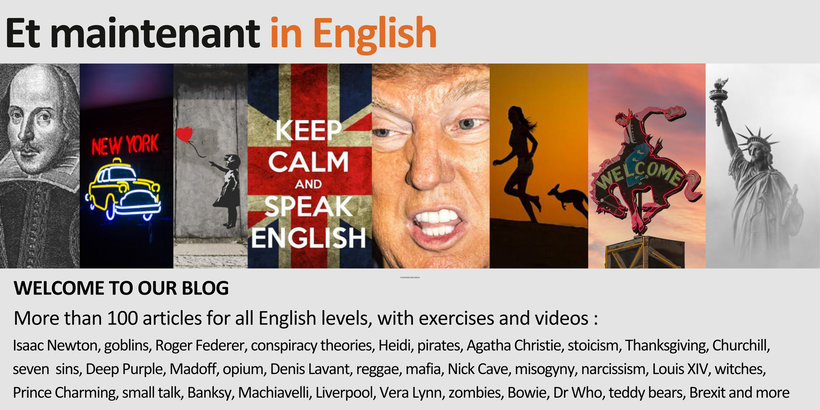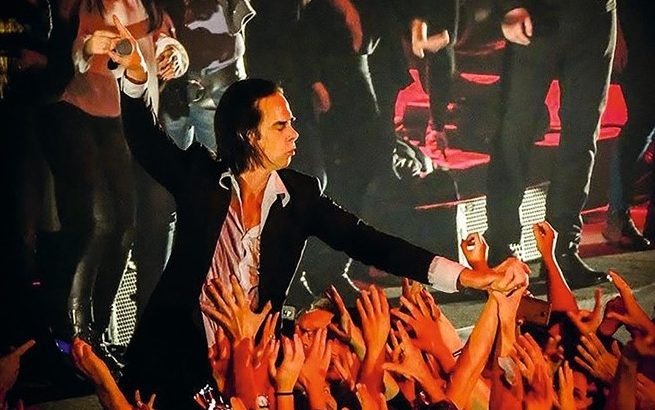Level C1 and above
Fans, those people that adore another human, have often troubled me. To be fanatical about someone or something seems to be that little bit excessive.
For a non-fan, there is also an element of jealousy; an envy of that all-encompassing, undaunted enthusiasm and the joy and confidence of belonging.
I am a fan of one man. His name is Nick Cave. He has shared the fury and joys of my relatively mundane existence for many years. He’s been both my pressure cooker, where rage and frustration can escape, and my inner-whisperer in moments of tenderness and vulnerability.
Nick Cave is an Australian musician, writer, singer-songwriter, author, screenwriter, composer and occasional actor. He’s best known as the front man of the band Nick Cave and the Bad Seeds.
He is also a wonderful agony aunt. Cave has invited his fans to share their intimate questions on a website called Red Hand Files, a reference to his song Red Right Hand, the theme music from the series Peaky Blinders.
Subscribe to our blog to receive our regular updates by email (details on the right-hand side column)
On the website Nick Cave writes:
You can ask me anything.
Yes, I know fans can be boring. It’s all a bit personal and yes, Nick Cave, just like Céline Dion, Michael Jackson or Kim Kardashian are some, but not everyone’s cup of tea.
Let me just say, in good old straight fan-speak, his concerts are mesmerising. Too strong a word? You have to forgive me. I’m a fan. His songs reach deep into your soul and his lyrics are poetry. He has experienced deep tragedy which has transformed his music and his artistic dialogue with the world. His music is cinematic, dealing with violence, madness, intense love, death, religion and beauty. But since the death of his twin son, his voice and presence have grown, transformed by grief, imbued with kindness, empathy and love. His concerts are in an intense love-fest for his fans. He gives with great honesty, humour and lyrical delight.
If you are looking for words that explores the human condition, here are few excerpts of his elegant and heartfelt responses to questions asked by his fans on Red Hand Files:
What is shyness?
Shyness is the tentative sound of the orchestra tuning up before the symphony begins. It is a beautiful, fractured piece of music in itself. It is the orchestra attempting to find its shared intent and is over all too quickly if you ask me.
In some circumstances shyness never finds its harmonic agreement and the situation will never be in tune. Yet shyness is a gift that can also be the sometimes crippling, often overpowering, intuition that the next thing life presents is potentially momentous, be it beautiful or devastating, where an exchanged few words or a gesture is a gateway to a new and unknown world. From these intimations of excruciating clarity, we can fall through our shyness into moments of earth-shaking significance, and our lives can change completely.
… My initial dinner ‘date’ with Susie (his wife) was an awkward and hesitant affair because we both intuited, on some deep level, that we stood at the threshold of another life that would stretch on indefinitely into the future. We did not know what that life would be, and it was undeclared between us, but our mutual shyness was the orchestra tuning up, with its flutters and discords, as it tried to find its shared melodic objective. In the end, I did what was a potentially life-deranging act and lunged hideously and impulsively through the membrane of our mutual shyness, grabbed my future wife and kissed her. She responded in kind and our shyness dropped away and, well, the symphony began. Shyness became the firewall through which we walked to a strange and different world, and here we are, together.
I feel very bad about myself, I cannot see anything positive in my body, I hate to look at myself in the mirror and it makes me suffer a lot. I feel like everyone is better than me, even though I did very important things for being just 16 years old. How should I behave? What should I do for myself?
…the question took me back to my adolescence and the troubled relationship I had with my own reflected image, and those nightmarish teenage years lived inside the pitiless mirror. I’m afraid to say this constant self-evaluation does not significantly decrease as you grow older, however it does become more manageable. I live mostly in hotels these days, and as I cautiously enter a different bathroom each night, with its angled mirrors and merciless lighting, I stand before the mirror at my most defenceless and exposed, and watch it do its worst. I often wonder how much accumulated misery a hotel mirror contains as it reflects back at us what appears to be our essential self. But, of course, what the mirror projects is not our true self at all but only our reflected outer-shell. What is virtually impossible to see within a mirror is that the very essence of our humanness, our vulnerability and fragility, is the most beautiful thing we possess.
Yet, when we are young that vulnerability can appear to us as shame or weakness, as we attempt to brace ourselves against what we may see as a brutal, unforgiving and judgemental world. But those who have no awareness of their own fragility, who present themselves as overconfident, armoured-up and invulnerable, sacrifice the essence of what makes them both human and beautiful.
Vulnerability is the very thing that permits us to connect with each other, to recognise in others the same discomfort they have with themselves and with their place in the world. Vulnerability is the engine of compassion, and can be a superpower, a special vision that allows us to see the quivering, wounded inner world that most of us possess.
How long will I be alone?
Aloneness and loneliness are two very different things, of course. I spend much of my time alone; I always have. I have learnt that being alone, as bereft as it perhaps feels to some, is busy with meaning and disclosure. For me, it is an essential place that intensifies the essence of oneself, in all its rampant need. It is the site of demons and sudden angels and raw truths; a quiet, haunted place and a place of unforeseen understandings. A place of unmasking and unveiling. It can be industrious or melancholic or frightening, sometimes all at the same time, yet within it there is a feeling of a latent promise that holds great power. Like Jesus praying alone in the garden, or Mary Magdalene alone at the mouth of Christ’s tomb, aloneness holds moments that tremble on the brink of revelation and great change.
And then there is loneliness, which is aloneness without choice, an enforced condition that yearns for recognition, to be seen and to be heard. This brave and unguarded admission appears to be the aching heart of your question. As I sat on the plane travelling to Reykjavik for the last show of my ‘In Conversation’ tour, I felt suddenly that there was something I could say to you. Having spent much time travelling on this tour alone, it struck me that your question didn’t have to be answered, but simply acknowledged; that to reach out to you, as you reached out to me, could in itself be the answer and, perhaps, a remedy – to say to you, you are not alone, we are here, and that we, a multitude, are thinking of you.
How do you forgive somebody whom you love very much but has done something truly terrible?
Forgiveness is a form of self-rescue that goes, at times, against our very nature. Forgiveness can prevent us from becoming the living definition of the injury that has been inflicted upon us – from being consumed by anger, pain, resentment and bitterness. But how difficult it is to sometimes forgive; how unfair it seems to reward offence with compassion. Yet, despite our intuitions, despite the seeming insanity of the enterprise, we must try, because forgiveness can be the way to self-preservation. Forgiveness is an act of self-love where the malignancy you have endured can become the motivating force that helps enlarge the capacity of the heart.
How to forgive the unforgivable? Now there is a question. Sometimes we feel the crime is such a violation, and so egregious, that it is beyond absolution – but the struggle to forgive is where it can find its true meaning. Even the attempt to move toward forgiveness allows us the opportunity to touch the borders of grace. To try is an act of resistance against the forces of malevolence – a form of defiant grace.
See forgiveness as a gift, not to the person who has committed the injury, but to yourself, in the form of self-protection. The sooner you start the process, the less time you may spend imprisoned by resentment and bitterness, hopefully moving toward a more resilient self. To try and fail is in itself a form of betterment. There are times forgiveness is beyond us but still we must reach, still we must strive.
Considering human imagination the last piece of wilderness, do you think AI will ever be able to write a good song?
… I don’t feel that when we listen to Smells Like Teen Spirit it is only the song that we are listening to. It feels to me, that what we are actually listening to is a withdrawn and alienated young man’s journey out of the small American town of Aberdeen – a young man who by any measure was a walking bundle of dysfunction and human limitation – a young man who had the temerity to howl his particular pain into a microphone and in doing so, by way of the heavens, reach into the hearts of a generation. We are also listening to Iggy Pop walk across his audience’s hands and smear himself in peanut butter whilst singing 1970. We are listening to Beethoven compose the Ninth Symphony while almost totally deaf. We are listening to Prince, that tiny cluster of purple atoms, singing in the pouring rain at the Super Bowl and blowing everyone’s minds. We are listening to Nina Simone stuff all her rage and disappointment into the most tender of love songs. We are listening to Paganini continue to play his Stradivarius as the strings snapped. We are listening to Jimi Hendrix kneel and set fire to his own instrument.
What we are actually listening to is human limitation and the audacity to transcend it. Artificial Intelligence, for all its unlimited potential, simply doesn’t have this capacity. How could it? And this is the essence of transcendence. If we have limitless potential then what is there to transcend? And therefore what is the purpose of the imagination at all. Music has the ability to touch the celestial sphere with the tips of its fingers and the awe and wonder we feel is in the desperate temerity of the reach, not just the outcome. Where is the transcendent splendour in unlimited potential? So to answer your question, Peter, AI would have the capacity to write a good song, but not a great one. It lacks the nerve.
You can read more here: Red Hand Files
The latest album by Nick Cave and the Bad Seeds is called Ghosteen.


